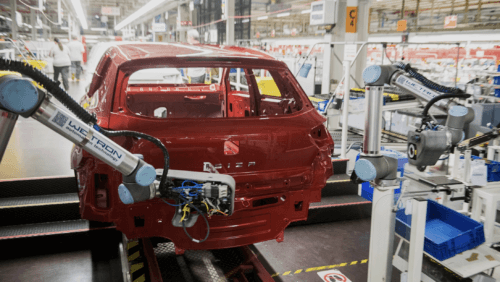The Spanish car manufacturer is able to produce and assemble about 300 ventilators per day that are distributed throughout Europe to intensive care units

The morbidity situation in Spain (102 active patients, 327 confirmed patients) resulted in the mobilization of all systems in the country. The Spanish car manufacturer Seat also mobilized and converted a car production line for the production and assembly of ventilators, which proved to be essential for every hospital. The cobots (collaborative robots) of the factory, which were previously involved in assembling parts in Ibiza or Arona model cars, were also assigned to the task. The new assembly line provides approximately 300 ventilators per day intended for intensive care units throughout Europe, and it operates intermittently, according to the needs and the number of patients requiring ventilation.
Seat's cobots from Universal Robots' UR10e models, which can work 24/7, without getting tired, without any physical separation between the robots and the workers performing assembly and without fear of corona infection, were equipped with a special system of artificial vision, which is used in several stages of the process, to make final adjustments to the machines And their role in force: quality check of the locking mechanism in the control box of the breathing systems.
The cobots in the factory are just part of an army of over 2,000 industrial robots, which operate on the factory premises alongside the 8,000 human workers. Total output on a typical day: assembly of 2,400 vehicles daily, or one car approximately every 30 seconds.
According to Dr. Rainer Pesal, the plant's manager, "the company positions itself at the forefront of innovation and the integration of collaborative robots makes it possible to be more flexible, agile and more efficient and is another example of commitment to the Industry 4.0 vision." The inherent flexibility of the UR cobots, the quick programming and the ability to easily change their purpose, help support the development and rapid deployment of automation - a feature that is always important but especially in times of crisis.'
Another important feature that Psal points out is that the cobot is semi-autonomous. "This allows for remote control using a tablet or laptop, which ensures compliance with social distancing regulations."
"2020 was expected to revitalize the automotive energy semiconductor market," said Kevin Anderson, field leader for electrical, automotive and industrial semiconductors for Omedia. “However, the COVID-19 pandemic has caused the closure of most mechanical assembly plants for several weeks – first in China and then all over the world. At the same time, demand for new vehicles fell as dealerships closed, and as potential buyers lost jobs or at the very least took pay cuts in many parts of the world. "
Even the reopened factories are not operating at full capacity, due to a lack of components and a reduction in the number of workers on the production lines due to the need to implement social distancing. As a result, less than 70 million cars are expected to be produced this year, a decrease of more than 20 percent compared to 2019.
More of the topic in Hayadan:
- Corona 2025: How the epidemic is changing our world - a series of video lectures
- Researchers at the Technion, in Spain and in the UK present a new-old approach to disinfecting air and surfaces from the corona virus
- New technology for locating corona patients and warning of critical breathing problems - a development by researchers at the Technion and Rambam
